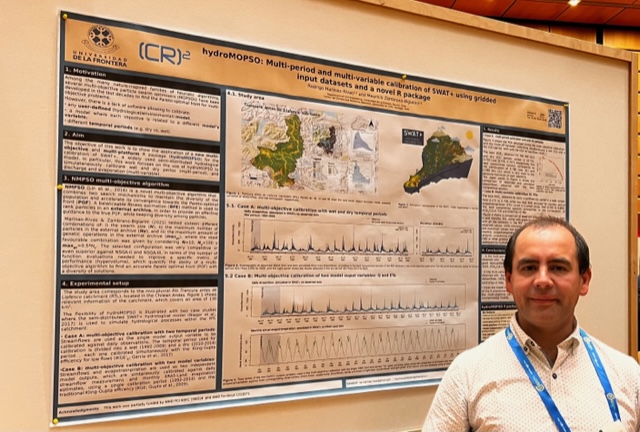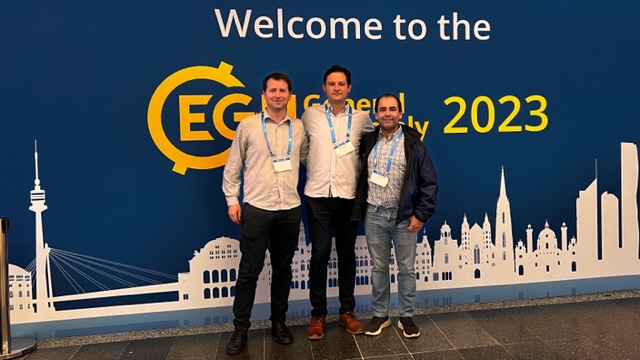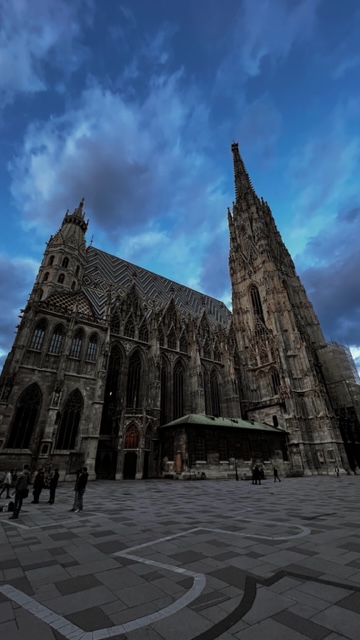Four works at EGU 2023
by Mauricio Zambrano-Bigiarini
During the week of April 24 to 28, 2023, I participated in the European Geosciences Union Conference (EGU 2023), held in the city of Wien (Austria). On this occasion, I presented two works and participated in other two:
1) A new software for spatio-temporal analysis of gridded data sources. In this work, I presented hydroRTS, a new package for the R statistical environment that is about to be submitted to CRAN. This package expands the functions of the terra package to work with gridded data that has a time attribute. In particular, hydroRTS allows you to work efficiently with large amounts of gridded data that have an hourly, daily, monthly, or annual time frequency. This work summarizes a large amount of work that I has done since 2013. However, only the collaboration of Civil Engineer Sebastián Bernal, graduated in 2022 from Civil Engineering at the Universidad de la Frontera, allowed to systematically organize and adequately document a set of functions that are useful for the Hydrological and Earth Sciences community worldwide. This collaboration was only possible thanks to funding provided by the Chile-China international collaboration project NSFC 190018.
2) Multi-period and multi-variable calibration of SWAT+ using gridded input datasets and a novel R package. In this work, I presented to the international community an application of hydroMOPSO, an R package for global multi-objective optimization. In this work, two cases of multi-objective calibration of the SWAT+ semi-distributed hydrological model in the Trancura River Basin before Llafenco (Araucanía Region) were analyzed. In the first case study, the SWAT+ model was simultaneously calibrated for two time periods: one with normal/wet conditions and one with dry conditions (i.e., below-normal rainfall). In the second case study, daily flows at the outlet of the basin and average monthly real evapotranspiration throughout the basin were calibrated simultaneously. This package has been developed by Civil Engineer Rodrigo Marinao, who is a graduate of Civil Engineering at the Universidad de la Frontera, a student of the Master’s Degree in Engineering Sciences from the same university, and a research assistant at the Center for Climate and Resilience Research (CR2). The collaboration between the Marine Engineer and I began from the Hydrology course in the Civil Engineering degree, and has continued uninterrupted since then. This work also received funding from the Chile-China international collaboration project NSFC 190018.

3) Effective hydrological drought monitoring depending on the catchment’s hydrological regime. In this paper, Dr. Oscar Baez-Villanueva (TH Köln, Germany) presented a paper that analyzes which meteorological drought indices (SPI, SPEI), soil moisture (ESSMI) or snow (SSWEI) are more related to the occurrence of hydrological drought (SSI-1), based on the hydrological regime (i.e., pluvial, pluvio-nival, nivo-pluvial, nival) of 100 basins of Central-South Chile. This work has been carried out in collaboration with me within the framework of the project “Drought and water security platform for catchment planning: historical evolution and future trajectories under global change”, financed by ANID in the Rapid Assignment Contest Fondo de Strategic Research in Drought for the year 2021, whose director is Dr. Camila Álvarez Garreón (CR2).
4) Historical and projected drought characteristics across different hydrological regimes in Central Chile. In this paper, Fabian Lema, a Master’s candidate at the Faculty of Engineering of the University of Chile, presented a paper where the characteristics of drought events in six basins of Central-South Chile are analyzed, both for a historical period and for a future period. Dr. Pablo Mendoza from the University of Chile invited I to participate in this work thanks to his collaboration as an evaluating member of Fabián Lema’s Master’s thesis.
Finally, during this conference, I took the opportunity to discuss, among other things, postgraduate collaboration possibilities with Dr. Paul Block from the University of Wisconsin-Madison (USA) and to talk about a joint article with Dr. Oscar Baez-Villanueva from the TH Köln University of Applied Sciences (Germany) and with Dr. Hylke Beck from the King Abdullah University of Science and Technology (Arabia Saudita).


Subscribe via RSS
